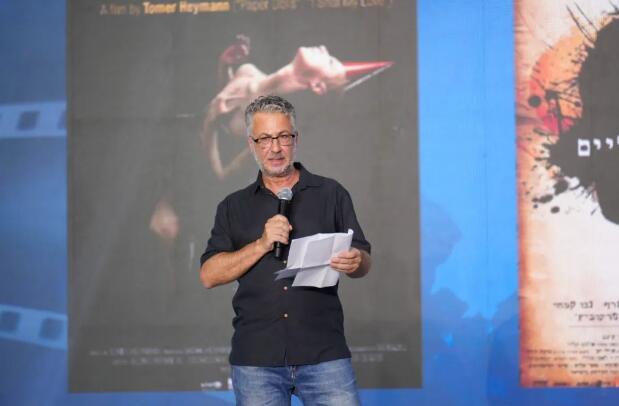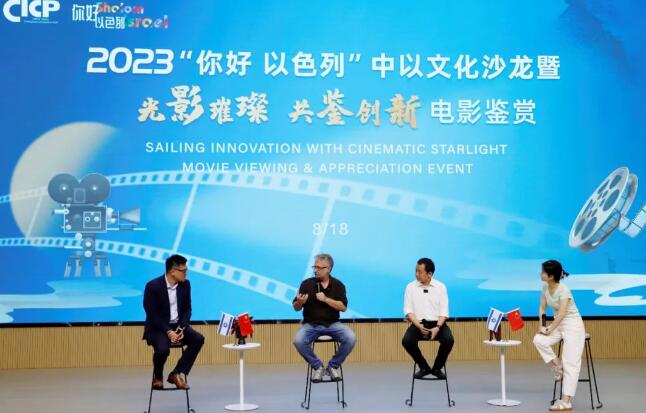


Duki Dror
A gentleman with curly hair, a black top and jeans, and distinctive artistic temperament… That is the “first impression” that Duki Dror left on us. His eyes behind the camera, reason, tenacity and calmness are quite impressive. Documentary is the art of images. As an excellent documentary director, Duki possesses the “judgment” to perceive images and is a visual artist who knows how to unleash the potential of images. Born in Tel Aviv, Duki went to UCLA and Columbia College to study. He has been a director on 23 films and a producer on six other films. Focusing on important social issues such as migration, identity and displacement, Duki’s films inspire the audiences to rethink profoundly and stir up their feelings through an in-depth analysis of those complicated problems. His works not only demonstrate the rich diversity of Israeli society and culture, but also present the shared emotions and experiences of human beings facing difficulties. His extensive body of work has won him international attention and success and are distributed worldwide.
In the past few years, Duki has undergone a change, looking for a broader audience and for platforms outside of Israel, which will allow him to reach an international audience. He is widely praised for his hit Netflix seriesInside The Mossad. His films, such asMendelsohn’s Incessant VisionsandRaging Dove, have won numerous awards on the film festival circuit, showcasing his unique viewpoints on the art of film and his ingenious creation techniques.

Taking the opportunity of 2023 Changzhou “Israel Summer Film Week”, the CICP invited the Israeli documentary director Duki Dror to attend the launching ceremony of the film week. He also participated as a special guest in the “Hello Israel” China-Israel Cultural Salon and the film appreciation event themed "Unveiling Cinematic Delights: A Cultural Exchange through Innovation ", where he talked face-to-face with film enthusiasts to share his creation concepts and insights into the film and television industry.
During the exchange, director Duki shared with us his original intention of filming documentaries. He frankly admitted that he had encountered many challenges when producing documentaries, and explained how to exercise subjective initiative in the face of difficulties and how to implement innovative ideas during shooting. Director Duki’s sincere words moved the audience present.
Q&A
Vivian:What inspired you to get involved in producing documentaries?
Duki Dror:I grew up in Tel Aviv. After my military service, I traveled to Chicago and Los Angeles to study film and television production. On the eve of graduation, our professor asked us to submit a five-minute documentary. I got a special opportunity.That experience seems to open another window of my fate. I developed special connections with those people in a parallel world and recorded their stories and thoughts with a camera. With that student film, I was invited to a prestigious Festival, in the Pompidou Center in Paris, for a series called “Landmarks in American Documentary Film”, where I met renowned documentary filmmakers Al Meisels and Richard Leacock. Since then, I have started my career as a documentary director and have been working continuously for 25 years.
Vivian:Short videos of “film narration”, most of which last about five minutes, split and shorten the plots and scenes of a movie and add narrations or voice-overs. Nowadays, those short videos are gaining popularity among young people, and audiences are losing patience with watching a complete movie. What do you think of this phenomenon?
Duki Dror:The film and television industry is expanding at an unprecedented speed, showing an explosive growth trend. In modern life, screens have been widely used. For example, cinemas, computers, mobile phones and even smart refrigerators are equipped with screens. These ubiquitous screens need content to enrich their features, and the presentation of content is often inseparable from the support of good stories; No matter how human communication methods change, that fact will remain unchanged. Of course, the length of those videos will be shorter after being compressed and streamlined, their presentation forms will change constantly with the development of technology, and the narrations used will vary greatly. However, the change in the presentation forms will never shake the importance of content production. The industry will always maintain a strong development momentum.
Vivian:In the past few years, you have also dipped your toe into television, and you have also changed your cinematic style.Are there other things that you want to look at, in terms of how to tell a story? What do you want to do next?
Duki Dror:I follow a lot of topics, most of which are TV plays, as I’m fascinated by the continuous plot construction and theatricality. My audience is not limited to Israelis, and I hope to utilize the content to showcase my talent to the wider world. I’m eager to break through the invisible glass ceiling. It’s worth mentioning that the gene of a film or television work is whether storytelling and dramatic conflicts can resonate with the audience, be it a movie or a TV series. If the audience can deeply feel the conflicts and hardships confronted by the characters through a movie or television production, the story gains universal appeal. In other words, by empathizing and identifying with the experiences of the characters, the audience can transcend regional, cultural, and social differences to resonate with the characters in a story. Therefore, outstanding films and television dramas should not only tell a gripping story, but also enable the audience to sample the shared feelings and values of mankind.
Vivian:You watched the promotional film in our exhibition hall during your visit to the CICP. What did you feel about it?
Duki Dror:I saw a story about developing from 0 to 1, from 1 to 100 and from 100 to ∞ in the promotional film of the park. I hope that we will have the chance to cooperate. After learning more about the CICP, I will tell the story of joint innovation by adopting Israeli’ perspectives and a narrative approach that is more in line with Israeli logic, and acquire source materials in the two places to present the story through a documentary. Of course, it is another story.
2025-05-13
2025-05-09
2025-05-08
2025-05-07
2025-05-06
2025-04-08
2025-01-27
2025-01-24
2024-11-12
2024-10-12